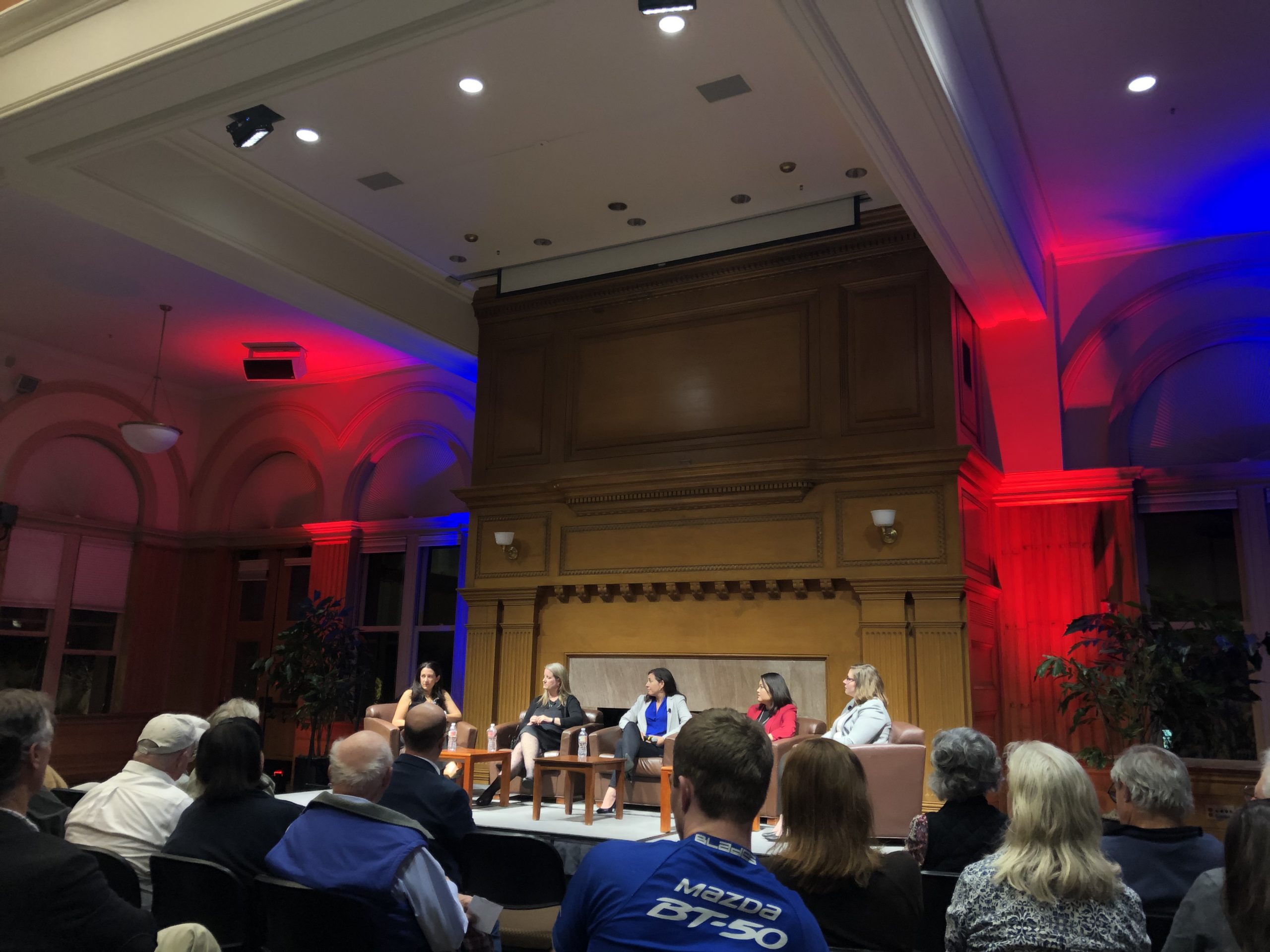Four reporters from key swing states cast predictions about the 2020 election and discussed current news trends at the 11th annual Rebele Symposium.
Communications department lecturer Janine Zacharia moderated the talk, which included journalists from Pennsylvania, Wisconsin, Michigan and Florida. The reporters were Amy Hollyfield, an editor at the Tampa Bay Times; Emily Lawler, a Lansing-based political reporter and editor at MLive.com; Mica Soellner, a reporter for the Appleton Post Crescent and the USA TODAY NETWORK-Wisconsin; and Julia Terruso, a reporter at the Philadelphia Inquirer.
They discussed swing-state coverage of the presidential election, voter suppression, fake news and distrust of the media.
2020 coverage
All the reporters expressed surprise at the Super Tuesday primary results.
“It shows how unpredictable the election is turning out to be,” Sollner said. “We are seeing a massive divide in the Democratic party which is going to determine who shows up to the polls.”
She added that voter turnout was especially important, given the fact that Trump supporters would “show up no matter what.”
Lawler was optimistic about voter turnout in Michigan, which had expanded access to the ballot with same-day registration and no-reason absentee ballots, leading to a 71% increase in absentee ballots issued.
Hollyfield, on the other hand, discussed the issue of felons’ ability to vote in Florida, which recently made the restoration of voting rights contingent on criminal debt payments.
“A lot of formerly incarcerated people in Pennsylvania don’t even realize they can vote,” Terruso added.
The reporters discussed the front-runners in their respective states.
“[Former Vice President Joe] Biden is the establishment pick,” Hollyfield said. “That’s who people expect to win, but none of the candidates have really campaigned in Florida yet, so it will be a toss-up as to who will win the state.”
She predicted that if Sen. Bernie Sanders (I-Vt.) were the Democratic nominee, Trump would win the state of Florida, given Sanders’ recent comments praising facets of the communist Cuban revolution.
Terruso said that Biden was most likely to win in Pennsylvania, given his roots in the state and his recent momentum.
Soellner saw support for Sanders in Wisconsin, fueled by a strong youth movement from universities across the state.
Lawler, too, predicted that Michigan would be won by Sanders, who shocked moderates by winning the state in 2016.
“He has the capacity to do that again in 2020,” Lawler said, “because a huge emerging demographic is college students who are invested in Sanders.”
Distrust of the media
All of the reporters expressed concern at the nation’s growing distrust of the media. Zacharia hypothesized that the distrust is connected to the declining number of local journalists, since she believes it is easier to demonize reporters who seem far away.
Soellner agreed, saying that the local voters she has engaged with are often happy to be able to match a face to an article’s byline.
“A lot of people see the media as a huge conglomerate and don’t differentiate national from local outlets, or non-partisan from partisan outlets, ” Soellner added.
In response to an audience question about local-level news that may be missed on the national stage, Terruso spoke to the importance of the topic of fracking in Philadelphia.
Lawler identified the Flint water crisis as a major issue in Michigan, and said that people were looking for candidates who could promise improvements in infrastructure.
Hollyfield said that she has been falsely accused of spreading false information, photoshopping images and even for reporting an event before it occurred.
“Fake news is the way to talk about something that you don’t like or don’t care about,” Hollyfield said. “It’s the in-vogue way of putting something down.”
Soellner described the use of the phrase “fake news” as combatting ideas that do not align with a person’s values.
“As politics become more personal,” Soellner said, “voters see things that don’t cover their party or their candidate favorably as an attack on themselves, so they use the term to defend themselves.”
Terruso and Soellner said that they respond to attacks on their reporting or journalistic integrity with facts. Sometimes, they said, critics are not expecting a response, and change their minds or issue an apology.
“I’m hopeful,” Soellner said. “I see this as making a difference one person at a time.”
Contact Marianne Lu at mlu23 ‘at’ stanford.edu.
